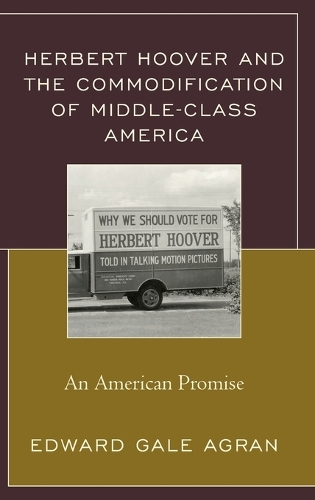
Herbert Hoover and the Commodification of Middle-Class America: An American Promise
(Hardback)
Publishing Details
Herbert Hoover and the Commodification of Middle-Class America: An American Promise
By (Author) Edward Gale Agran
Bloomsbury Publishing PLC
Lexington Books
15th August 2016
United States
Classifications
Professional and Scholarly
Non Fiction
History of the Americas
Constitution: government and the state
973.916092
Physical Properties
Hardback
296
Width 164mm, Height 232mm, Spine 28mm
608g
Description
Herbert Hoover rose from a rudimentary background to establish himself as a self-made millionaire and leading progressive reformer. Until the disaster that hit the nation in 1929, Hoover was known globally as the Great Humanitarian who had saved the lives of scores of millions of Europeans and Asians during and following WWI. As Secretary of Commerce through the twenties, the Great Engineer constructed, tooled, and fine-tuned the most powerful economy in the world. Hoover was celebrated as a representative product of Americas rise to global domination and a formidable voice for progressivism who could finish the job in the White House. The Depression was Hoovers undoing, but historians recognize they must take account of his considerable contributions to the creation of twentieth-century America. As we learn more of that America, Hoover makes more sense. With due consideration of Hoovers accomplishments, one can further understand the construction of the American industrial and corporate economy, progressivism and the New Deal, and political posturing throughout the century. Equally significant, one can comprehend twentieth-century cash-box culture and Hoovers formidable contributions as a public servant to the commodification of American life. He endeavored to establish that all could fulfill a secure, middle-class lifein essence, achieve the American Dream. This concept in part was created by Hoover, who also was considered one of the nations public-relations geniuses. The political establishment continues to build upon the social and cultural foundation he laid. That foundation, while under stress, remains fundamentally sound as the nation enters the twenty-first century. The criticisms rained down upon American materialism echo dangers Hoover warned against. He subscribed to the maxim that a genuinely good society is not one premised upon material values; it is established upon a widely distributed sense of well-being grounded in service and compassion. Hoover never lost sight of the imperative of selflessness for the good of others, the nation, and oneself within an individualistically driven society rich in comforts and security. He sedulously worked to create a middle-class identity which spoke to material well-being and fundamental decency. A true believer, Herbert Clark Hoover energetically embraced the American Promise.
Reviews
Edward Agran has imaginatively and intriguingly rethought a figure that still remains easier to condemn than to understand. In this fluidly written work, Herbert Hoover both comes alive and fits into a larger cultural and political context. In the process, readers also get a wonderful opportunity to rethink the meaning of that most peculiar creature, the American Middle Class. -- Robert D. Johnston, University of Illinois at Chicago, author of The Radical Middle Class: Populist Democracy and the Question of Capitalism in Progressive Era Portland, Oregon
Professor Agrans avowed purpose is to reexamine the life and works of Herbert Hoover from the standpoint of a cultural historian. And in this rich and insightful meditation on Hoovers activities, writings, and historical legacy, he shows in detail how this perspective can add to and broaden our understanding of the mans role and place in American history. Of particular note and value are his strongly supported conclusions concerning Hoovers vision of and prescriptions for realizing a progressive future, the central place in that future of a new, consumer-oriented, and expanding middle class, Hoovers pariah status as a discredited huckster during the 1930s, and the central role of Hoover as a transitional, prophetic, and still relevant figure when viewed from the vantage point of our own times. -- Ellis W. Hawley, University of Iowa
Herbert Hoover, Edward Agran argues, offered Americans an expansive version of the progressives promise of material prosperity and spiritual fulfillment. If he had been luckier in the timing of his presidency, and if he had been able to express his vision in Agrans poetic language instead of burying it in an engineers facts and figures, his reputation would stand much higher among his countrymen. Herbert Hoover and the Commodification of Middle-Class America makes the case for Hoover better than Hoover could make it for himself. -- Kendrick A. Clements, University of South Carolina
Author Bio
Edward Gale Agran is professor of history at Wilmington College.
